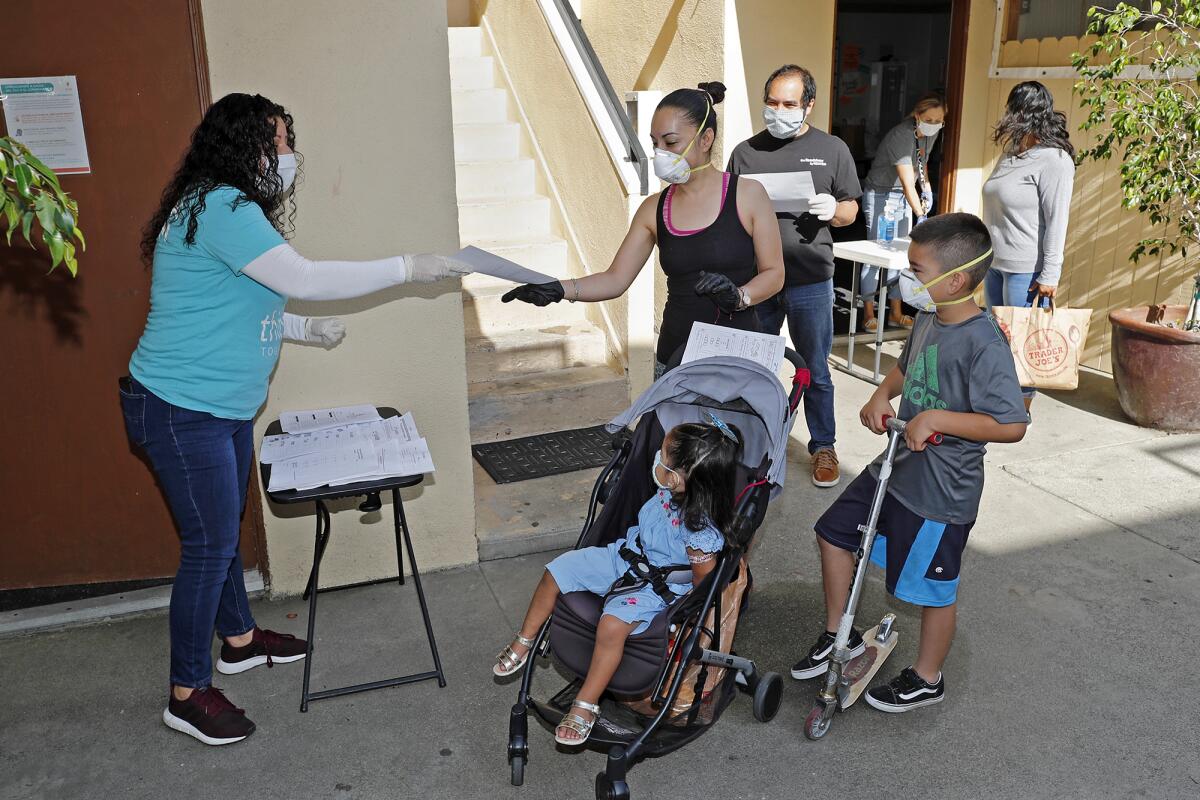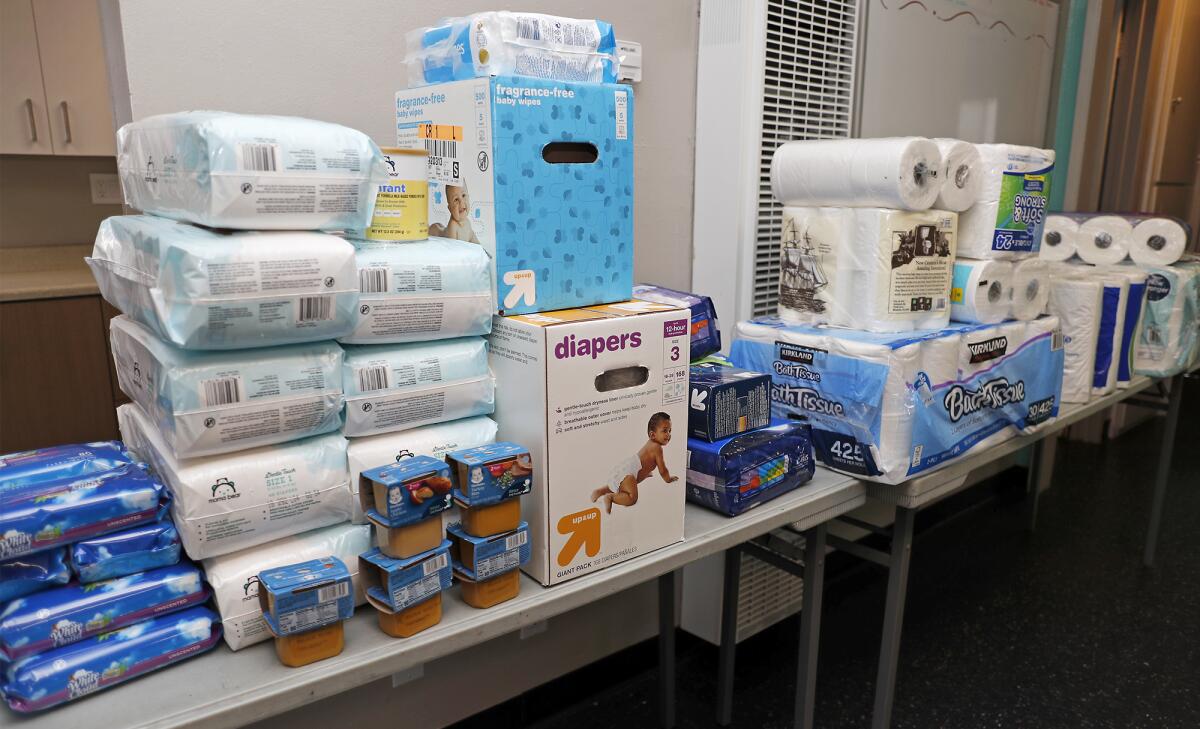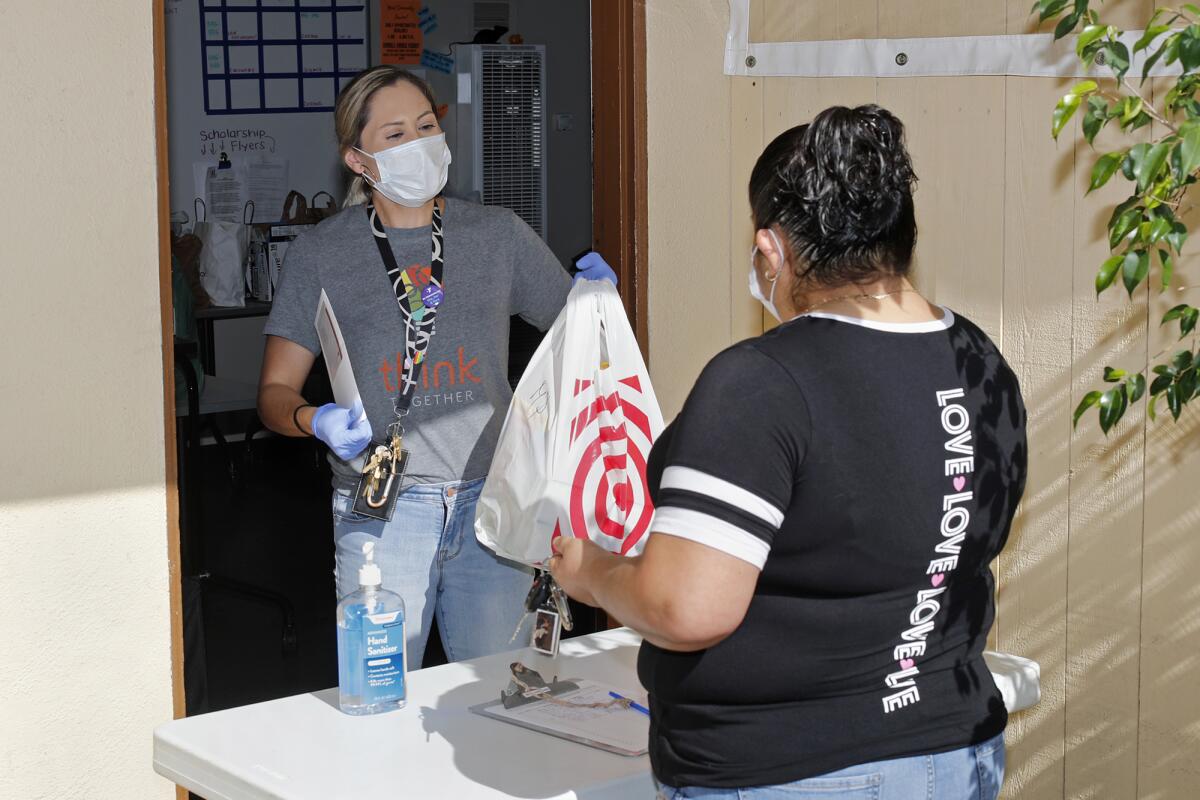Shalimar Learning Center comes to the rescue for panicked parents during coronavirus pandemic

- Share via
Emeteria Hernandez walked through the empty supermarket aisles, hunting for food, hand sanitizer and Clorox wipes for her family.
Nothing.
The month-old memory still brings fresh tears to her eyes.
“I thought the world was going to end,” said the 41-year-old cook, through the Spanish translation of Ruth Malagon. “And I didn’t have food for my [three] kids.”
That afternoon, she received a call from Myrna Zornoza, an educator at the Shalimar Learning Center, the Costa Mesa-based founding facility of the education nonprofit Think Together.
“What do you need?” asked “Ms. Myrna,” as Hernandez affectionately called her after two years of parenting classes for her and after-school teen classes for her son, Jeremy.
Soon, Hernandez received the first bins from Think Together, filed with food, sanitizer and soap. The next week, more food came. Then more food, soap, toothpaste and $100 gift cards.

In the age of the coronavirus, local organizations that offered one kind of service — such as Think Together’s educational programs after-school and during the summer — have found themselves pivoting to serve the ever-changing requests in an increasingly needy population.
The Shalimar Learning Center had just hit 25 years of offering educational services to about 120 families in its predominately Latino and low-income neighborhood in Westside Costa Mesa, called Shalimar. The center, which operates out of an apartment in Shalimar, was the go-to after-school place for nearly 250 neighborhood children whose parents worked multiple jobs. At different points, it also provided translation services for families, as well as all-around academic support and college and career guidance.
But then the coronavirus blew through, decimating the jobs of 100% of the center’s participating parents.
“Just all of a sudden, boom, they’re done,” said Randy Barth, Think Together’s CEO.
At Shalimar, he said, many of the parents were hourly workers — housekeepers, gardeners, restaurant and hotel workers — without severance benefits. Some were undocumented and, at the time, ineligible for federal stimulus aid.
Suddenly, the needs bottomed out. Without jobs or with severely reduced hours, parents didn’t have enough gas to drive to their children’s schools to pick up meals. Cell phone and internet bills went unpaid — and with them, the ability to participate in online learning.
Hernandez went from cooking five days a week at 2145 pizzeria in Costa Mesa down to nine hours per week. Her husband was let go from his day job cooking at The Pizza Bakery in Newport Beach. The family began relying solely on his evening job, which brought in 25 paid hours per week — and on Think Together.
“What everybody was talking about was, ‘We’re so scared, what are we going to do?’” said Melissa Arambula, 35, family and community coordinator for Shalimar. “A lot of that came from having food on their table. They were all losing their jobs. It was just a lot.
“We immediately started transition,” she added. “Academic support can wait; we need to meet basic needs right now.”

The center is accepting donations for basic food items, such as milk, eggs, bread and tortillas as well as nonperishable items. It has also set up the “Shalimar Relief Fund,” to finance the $100 debit gift cards that families get every week to help cover basic necessities such as groceries or gas. Fortunately, Think Together’s director of philanthropy Darcie Schott said, individual giving has ticked upward, as has company matching donations.
“[Shalimar] does represent some of our lower-income families and students, yet they’re very bright students and that community is in the shadows of some of the wealthiest communities and neighborhoods in Southern California,” Schott said. “There’s recognition of that and ownership and accountability.”
Now that the initial shock has passed, the center continues to expand its offerings to help families in other ways, such as supplying STEM and arts supplies for home learning, flushing out a distance learning after-school option, translating information from the city and district schools.
Perhaps now more than ever, Hernandez draws on Ms. Myrna’s parenting lessons.
“Every time I feel like I’m going to fall into depression, I remember all the words that they’ve taught me,” Hernandez said. “To always try and stay positive. To be strong in every moment. To try to make it through the difficult times that come our way in life.”
To donate to the Shalimar Relief Fund, visit: thinktogether.org/shalimarrelieffund.
All the latest on Orange County from Orange County.
Get our free TimesOC newsletter.
You may occasionally receive promotional content from the Daily Pilot.










